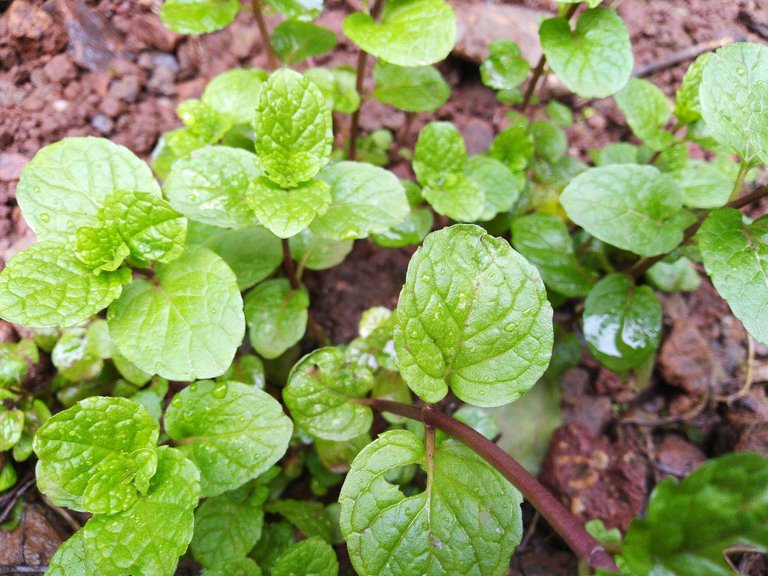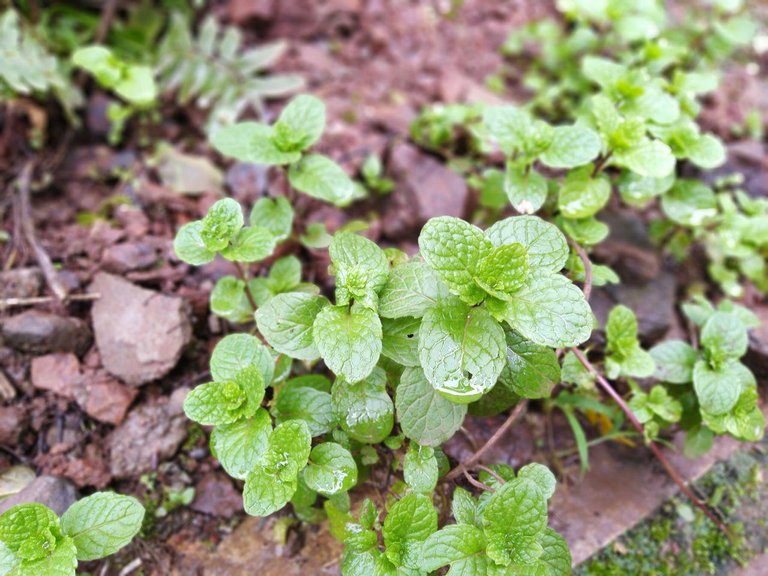
Everybody hears a lot about this beautiful and healthy plant called as a Mint or Mentha ( In India, its called as Pudina). It is one of the plants in the family Lamiaceae (mint family). Mint is really the perfect place to begin as you build your herb garden. It's easy to grow and is really fun to add to many recipes, whether breakfast, dinner or dessert. And don't forget to add a spring to a glass of iced tea on a hot summer afternoon. It's fragrant, fast-growing, green, and complements fruits, vegetables, and meats. It's also its own ice cream flavor. So what's not to love about mint? If you've ever grown the herb, you know where I'm going with this, but if you haven't and are interested: read on for the successfully growing mint in your home garden or in a container. and I will elaborate some health benefit of this marvelous plant.
Although mint is easy to grow, its roots, which are called "runners," are also incredibly invasive: they quickly grow, sprouting new leaves and new plants as they go. Mint will overtake a flower bed or garden in no time if you're not careful. So, read on for the Dos and Don'ts of Growing Mint:
DO's
- Ideally, they prefer a moist but well-drained site, something like their native habitat along stream banks.
- Mints are vigorous perennials that thrive in light soil with good drainage.
- When planting the herb in a flower bed, first submerge a container (either a pot, a mesh bag or edging to at least 5 inches deep), leaving the rim above ground level when potted, so the mint's fast-growing root system will be contained. Otherwise, the herb will take over your garden and lawn in an annoying weed-like fashion.
- Harvest mint sprigs before the plant flowers.
DON'T
- Plant mint in an open bed without first submerging a vessel that will contain the herb's wild-growing roots.
- If planting mint in a bed using a submerged pot, be sure it's not cracked. The "runners" will find their way out and continue to spread.
- Plant the herb in super moist conditions where it won't dry out.
What are the benefits of mint?

Allergies : Mint plants contain an antioxidant and anti-inflammatory agent called rosmarinic acid. This has been studied for its effectiveness in relieving seasonal allergy symptoms, revealing a promising natural treatment.
Gives you glowing and acne free skin : Mint has a unique property that soothes and calms itchy and infected skin. It has potent anti-inflammatory and anti-bacterial properties which work wonders on acne prone skin and is often used in a number of cleansers, toners and in some lip balms as well. The strong antioxidants present in mint leaves the skin with a natural glow and rehydrate dull and dry skin.
Common cold : Mint contains menthol, a natural aromatic decongestant that helps to break up phlegm and mucus, making it easier to expel. Menthol also has a cooling effect and can help relieve a sore throat, especially when combined with tea.
Helps fight oral infections : Mint leaves are packed with anti-bacterial and anti-inflammatory properties. That is why they are so great to for your oral health. It kills bacteria in the mouth preventing tooth decay, beats bad breath and keeps your tongue and teeth clean naturally. Just chew on a few leaves on mint regularly to keep dental diseases at bay.
Indigestion and gas : Mint is a calming and soothing herb that has been used for thousands of years to aid with upset stomach or indigestion. Mint is thought to increase bile secretion and encourage bile flow, which helps to speed and ease digestion (and which may also support healthy cholesterol levels). Peppermint is also thought to relieve pain and discomfort from gas and bloating. Peppermint tea is a common home remedy for flatulence.
Helps relieve menstrual cramps and pain : Since mint leaves purify the blood and have an anti-spasmodic effect on the soothe muscles of our body, it is a great remedy to relieve the pain of menstrual cramps. It also relieves nausea associated with the condition. Just brew a hot cup of mint tea and sip it several times through the day.
Irritable bowel syndrome (IBS) : The use of peppermint oil has been found to be an effective and safe treatment for those suffering from abdominal pain or discomfort associated with IBS.
good one...
Thank you
Peppermint is amazing. I love having it planted around taps on our homestead. A diluted spray of peppermint oil can also be used around the house to deter ants. Thanks for the comprehensive post!
Thank you so much
Hi! I am a robot. I just upvoted you! I found similar content that readers might be interested in:
https://www.apartmenttherapy.com/the-dos-donts-of-growing-mint-147458
Congratulations @herbalmedicine! You have completed the following achievement on Steemit and have been rewarded with new badge(s) :
Click on the badge to view your Board of Honor.
If you no longer want to receive notifications, reply to this comment with the word
STOPWoo-hoo! Yay! We adore your work, and we've upvoted your post with some @naturalmedicine love! Your article now has a chance to get curated and featured under the round-up of our blog.
If you're a supporter of all things natural healing, you might like to read our introductory post here. We'd also love to welcome you on Discord here!!